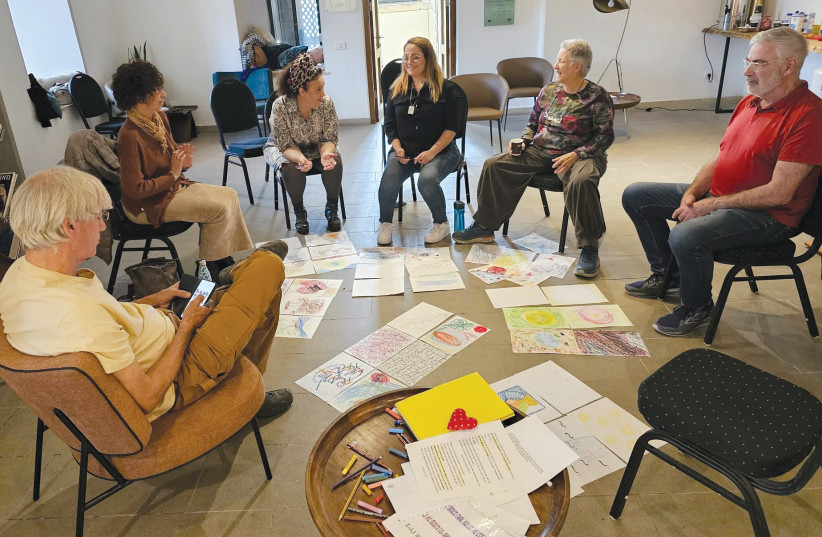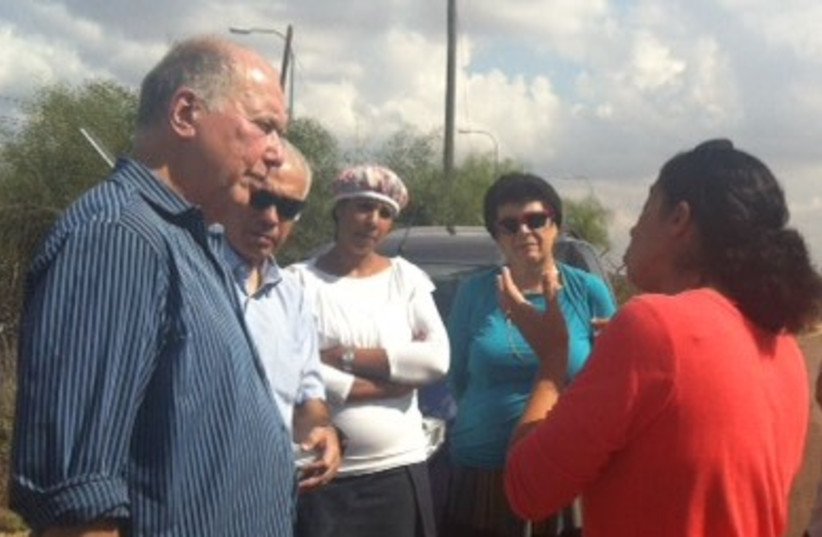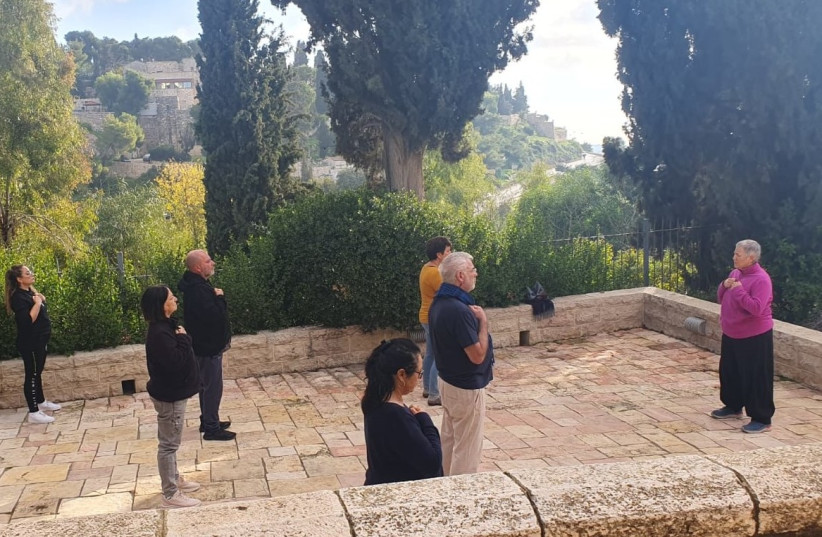“October 7 destroyed more than my home. It devastated my sense of well-being.” These words, spoken by a Kibbutz Kfar Aza survivor, have been echoing throughout the country since that Black Sabbath. They are indicative of one of the greatest challenges Israelis have ever faced – and will continue to confront for years to come. The horrors of the inhumane terror attacks created an urgent need to help not only the direct victims but also ever-widening circles of Israeli society subjected to the ongoing stress of the hostage situation; the displacement of a quarter of a million residents of the southern and northern border communities; and the war. Virtually every Israeli home has been touched by a personal connection to those lost or wounded.
The Center for Mind-Body Medicine (CMBM), a US-based international humanitarian NGO, quickly embarked on a joint effort with the Mishkenot Sha’ananim Culture and Hospitality Center. Mishkenot, which initiated the partnership, provided through the generous support of the Jerusalem Foundation, the use of its magnificent facilities, including full room and board. CMBM, through its Israeli nonprofit, provided its top clinicians to create a three-day session (the first of many) to teach self-care skills, developed by CMBM’s founder, psychiatrist Dr. James Gordon.
Participants in the pilot workshop included survivors and others from around the country (with an emphasis on Kibbutz Kfar Aza, Be’eri, etc.), as well as health professionals and others dealing with PTSD. They had high praise for the workshop, enthusiastically endorsing the CMBM approach and self-care tools as “the most important things they have learned since Oct. 7.” The CMBM workshop provided them with a personal “tool-kit” of extremely effective techniques that promote self-care, based on Dr. Gordon’s outlook that “All people have the capacity to understand, help, and heal themselves.”
Helping Israelis deal with PTSD
Jerusalem-based psychologist Dr. Rhonda Adessky, CMBM-Israel’s clinical director, was instrumental in organizing and supervising the training. She shared several insights to help explain what made it so special: “We worked mostly in small groups of six to eight people, with two professional group leaders in each. There was no labeling, as facilitators and participants from mixed populations quickly came to see themselves and others as equals and felt comfortable sharing perspectives in a safe setting of mutual concern.”
Small groups are particularly important in providing support for participants who, according to Dr. Gordon, “see that they are not alone in their suffering. They quickly adopt a team mentality, supporting each other in order to move the healing work ahead, creating the basis for a wider, healing community.

An example of techniques that were used included Creative Self-Expression, in which participants make drawings of themselves several times: first, as they are today; then, while asking them to define their greatest problems; and then, visualizing where they want to be in the future. Another effective tool called Dialogue with a Symptom or a Problem was a writing exercise that involved confronting an issue by naming it, and then taking it on. Both exercises reflect a view that focuses on the here and now rather than dwelling on the past. Performing these exercises in small groups enabled participants to work on their own issues in a warm and safe environment. They could speak from their hearts without the fear that they would be judged or given advice.
The workshop also included healing techniques performed in larger groups, such as sessions that involved movement to music (with eyes closed) or one that had participants dynamically shaking their bodies. A common thread throughout the workshop was a relaxation exercise involving diaphragmatic soft-belly breathing.
One particularly unusual aspect of the workshop was the heterogeneous make-up of its small groups. Many similar post-October 7 activities try to bring in people with similar experiences (such as Supernova music festival survivors or border kibbutz members). CMBM planners made a bold decision to create groups made up of people from different backgrounds. Every small group included those who were closest to the horrific events, like border kibbutz members or a Jerusalem woman who had been thrust into the role of helping to raise grandchildren who had lost their parents. The organizers mixed into each group people who were affected in different ways, such as evacuees or health professionals who came to learn techniques. This diversity helped people view their own experiences from different perspectives and created a healing bond within the groups.
At the end of the three days, the results were dramatic. Rami, who had spent 20 hours besieged in the tiny safe room of his Kibbutz Be’eri home while the terrorists burned the house down around him, was quick to appraise – and praise – the workshop.
“We were lifted out of our daily routine. We were brought together from a variety of circumstances… which helped us truly come together. The CMBM professionals who guided us on our journey were phenomenal. I was familiar with other therapeutic methods, but the small group format is precisely what I had been seeking. We were surrounded by a protecting environment that projected the warmth of a family. Another important factor was the distinct atmosphere of the Mishkenot Guest House with its comfortable rooms and breathtaking views. Their dedicated staff went out of their way to show they cared. It was a very meaningful experience.”
Rami’s personal ordeal was indicative of the country’s October 7 collective experience. The son of pioneering parents who helped found Be’eri, he was one of 14 family members spread in the safe rooms of eight different Be’eri homes, with another 10 family members on Kibbutz Nir Oz, and close friends throughout the area. Since that day, he has been a refugee in his own land. He saw the workshop as a practicum that allowed him to take away techniques that he could add to his self-care tool kit.

Dr. Ronit Eilon added a special perspective to her role as one of the talented CMBM group leaders. She is a 43-year Kfar Aza resident and has served area citizens for decades as a counselor in Sha’ar Hanegev, Hof Ashkelon, and Sderot schools, as well as providing therapy for clients throughout the region. Besides her hands-on professional experience dealing with PTSD, Eilon understands the phenomena as can only those who have lived through decades of bombardment. “As a group leader, I identify with others and sometimes get their meaning through their body language, without verbalization. I understand the depth of a broken soul…which will remain broken. It’s amazing to see how these tools can raise a person’s soul in only three days,” she said.
The communal healing took place during off hours as well. Participants had time to share a boutique Jerusalem beer while exploring the guest house’s charming nooks and crannies that have inspired the likes of Saul Bellow, Simone de Beauvoir, Isaac Stern, Jean-Paul Sartre, the Dalai Lama, Herman Wouk, and Amos Oz. Mishkenot also provided cultural evening activities such as bringing in an improv group that encouraged participants to join in the creative fun. Eilon, fully engaged with her dual role of Kfar Aza resident and therapist, said poignantly, “That’s the first time I’ve laughed in two months.”
Dr. Naomi Baum, who is responsible for bringing Jim Gordon’s CMBM approach to Israel following the spate of terror attacks in 2002, spoke of future steps to follow up on the highly successful program at Mishkenot. “We look forward to continuing our partnership. But we will expand our efforts to do what CMBM does best: training the trainers.”

CMBM is planning a professional training program (PTP), to be followed by an advanced training program (ATP) in which it will train and certify hundreds of professionals from mental health care and related fields, such as education and nursing. Dr. Naftali Halberstadt, who helped found the CMBM’s Israeli nonprofit, sees an important role for which CMBM is perfectly suited. “We are exploring the possibility of training therapists from resiliency centers as well as therapists from the Supernova community. We place great importance in providing therapists with self-care techniques to prevent burn out.”
Halberstadt took part in CMBM missions to places like Haiti after the earthquake, Kosovo, and at a VA hospital program in Minnesota for American soldiers returning from war zones. “An important advantage of our work is that it is evidence-based,” he concluded. “CMBM has consistently shown results in studies that document significant improvements in reducing effects of PTSD. We train dozens, who train hundreds, who train thousands. This approach will hopefully help us meet an unprecedented mental health challenge that faces Israeli society in the coming years.”
To learn more or to participate in a workshop, contact Meital Shapira, CMBM-Israel program director at meitalshapira5@gmail.com. For more about CMBM, see www.cmbm.org or Dr. Gordon’s book Transforming Trauma: The Path to Hope and Healing.■
Lt.-Col. (Res) Danny Grossman is a retired, decorated Israel Air Force fighter pilot who also served as Israel Director of the American Jewish Congress. While at AJCongress, he met Dr. Gordon and has assisted CMBM in its healing work for nearly 20 years.
